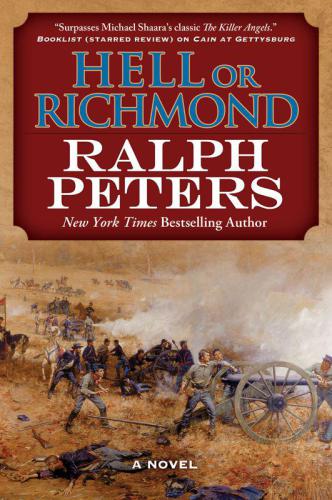
Hell or Richmond
کتاب های مرتبط
- اطلاعات
- نقد و بررسی
- دیدگاه کاربران
نقد و بررسی

July 8, 2013
During the 30 days of the Civil War that had "torn the country apart," the awful business of killing brings widespread suffering in Peters's impressive historical novel. Peters (Cain at Gettysburg) crafts a lurid spectacle of close, personal warfare; soldiers are drenched in scorching heat and humidity, soiled by rain and mud, choked by drifting smoke, exhausted from marching, and ill with dehydration and dysentery. The carnage is raw, violent, and frighteningly realistic, with deaths by bullet, bayonet, cannon shell, and fire. Some 70 real charactersâincluding key officers Ulysses S. Grant, Robert E. Lee, George Meade, Edward Perry, Francis Barlow, and William Oatesâdebate strategy and try to get along. An introspective Robert E. Lee ponders slavery and war: "Madcap fools had made this war, not soldiers. Now the soldiers must win it for the fools." Although the language is coarse, crude, and blunt, Peters can also wax eloquent on the nature of battle, the causes of the war, respect for "blood spilled and brethren lost", and offers occasional profundities: "There was no beauty, no âpoignancy,' in lives cut short in grim ways once unthinkable...Just this wanton slaughter, this enticing, seductive butchery, irresistible and revolting." This is an insightful, epic novel that nonetheless requires a high tolerance for gore and grit.

June 1, 2013
Swift-moving fictional reconstruction of the terrible Overland Campaign of 1864, which must have seemed to its participants to be never ending. "If historical fiction is properly done," Peters notes in the Author's Note that closes this novel, "it can bring history to life." Following on his novel Cain at Gettysburg (2012), Peters picks up the story that properly begins with Lee's rout and George Meade's failure to pursue and destroy the Army of Northern Virginia. Instead, it was up to a different commander a year later, as Ulysses S. Grant moved in from the west to assume command of the Union Army and pursue that goal. As Peters makes clear, Grant, though not unreflective, was not shy about sacrificing vast numbers of soldiers: They could be replaced on the Northern side far more quickly than could their Southern counterparts. As Peters also makes clear, Grant was sensitive to the politics that affected his conduct of the war: If the South was not soon defeated, Lincoln might not be re-elected, and his successor might well declare peace and leave the Union asunder; if Grant were victorious, conversely, he had a bright political future ahead of him, which was one reason not to alienate the aforementioned Meade. Peters' harrowing account begins and ends in the ocean of blood spilled between the Rappahannock and Cold Harbor. He writes with a fine balance of historical accuracy and drama, turning in telling portraits not just of the generals, but also of the privates from German farms and backwoods Appalachian huts who met and died on those Virginia battlefields. Occasionally, he is so swept up in events that his writing goes a little awry ("Grinning as wide as Galway Bay in the gloaming"), but more often it is right on the mark ("They had gone in a circle, blindfolded mules in a mill"). Not quite in the class as Michael Shaara or Shelby Steele, but a solid work of historical fiction all the same.
COPYRIGHT(2013) Kirkus Reviews, ALL RIGHTS RESERVED.

























دیدگاه کاربران